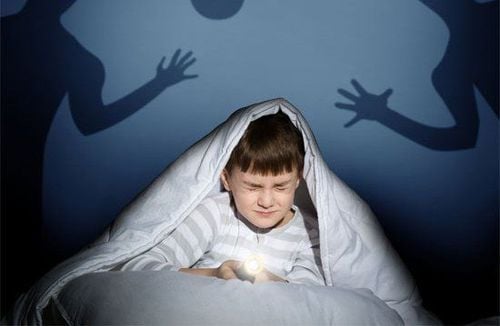This is an automatically translated article.
Night terrors are a common sleep disorder in the early stages of sleep. To create a safe space for children when a horror occurs, parents need to take measures to minimize the risk of falling, touching dangerous objects and leaving the house for children.
1. What is a night terror?
Night terrors are a type of sleep disorder in children. Manifestations are children suddenly standing upright on the bed, crying, screaming, groaning, mumbling, kicking in the state of eyes open. However, your baby does not respond to your attempts to comfort him because he is in a state of half-asleep and half-awake.
Each episode of sleep terrors in children lasts a few minutes to almost an hour, and when it's over, the child may suddenly fall back to sleep without remembering the incident.
Night terrors are more common in young children. A study of nearly 2,000 children found that 40% of children between the ages of 2 and a half to 6 years old experienced nocturnal terrors.
2. How are night terrors different from nightmares?
There are two characteristics that distinguish sleep terrors from nightmares:
Children with night terrors cannot recall what happened. Meanwhile, children with nightmares can recall the dream. Timing: Night terrors usually occur in the first third of the night. Meanwhile, nightmares are common in the last 1/3 of sleep. The easiest way to distinguish between night terrors and nightmares is to ask your child about the dream and assess his or her expressions. If the child is more agitated, he has had a nightmare. If your child sees you as a nuisance, chances are he has had a night terror.

Cha mẹ cần phân biệt giữa chứng giấc ngủ kinh hoàng và ác mộng ở trẻ
3. What to do if a child has night terrors?
Parents need to do the following things when witnessing a baby's horrible sleep:
Do not try to wake the child because all your efforts will only make the child lose his temper and have a worse tantrum. Do not try to comfort the child, unless there is a risk of harming the child himself. Just talk calmly and put dangerous objects away, and wait for the baby to fall asleep. Before bedtime, take the same precautions with sleepwalkers as tidying up the room, closing the gate at the top of the stairs, and making sure windows and doors are locked.
4. Causes and measures to prevent night terrors
There is no specific way to prevent nocturnal terrors as its cause is unknown. Just because a child has night terrors doesn't mean he's mentally ill or in a bad mood.
Certain factors increase the risk of night terrors, such as a child having a fever or not getting enough sleep. You should address these issues in conjunction with making sure your child goes to bed on time and on time.
Certain drugs or caffeine can also contribute to nocturnal terrors. The risk of this condition in children is higher if there is a family member who has had night terrors or other sleep disorders such as sleepwalking.
Sleep apnea is also a trigger for night terrors. Enlarged tonsils and adenoids block the airways during sleep, making breathing difficult and disrupting a child's sleep throughout the night. .
Certain conditions that prevent children from getting enough rest, such as restless legs syndrome or gastroesophageal reflux disease (GERD), can also cause night terrors. You should take your child to be tested for these conditions.

Cha mẹ nên đưa trẻ đến gặp bác sĩ để được thăm khám và điều trị sớm
5. What is a scheduled wake-up?
If you find that your baby's nocturnal terrors happen at the same time of night, you can try using the "scheduled wake-up" method. This can be easily done by waking the child gently and quickly about 15 or 20 minutes before the time of night terrors. This technique can change the child's sleep state to help prevent night terrors. With repetitive actions, children can learn to wake up automatically to avoid nocturnal terrors.
A child's night terrors can occur at different times during a child's sleep. Instead of trying to wake up the child at this time, parents should apply the above measures, and at the same time help the child form a biological clock, go to bed on time.
For children to be healthy and develop well, it is necessary to have a nutritious diet in terms of quantity and quality balance. If children are not provided with adequate and balanced nutrients, it will lead to diseases of excess or lack of nutrients, which adversely affect the comprehensive development of children in terms of physical, mental and motor skills.
Parents should supplement their children with supportive products containing lysine, essential micro-minerals and vitamins such as zinc, chromium, selenium, and B vitamins to help fully meet their child's nutritional needs. At the same time, these essential vitamins also support digestion, enhance nutrient absorption, help improve anorexia, and help children eat well.
Parents can learn more:
Signs of zinc deficiency in children
Micronutrient deficiency and failure to gain weight in children
Please regularly visit Vinmec.com website and update useful information to take care of your child. Take care of the baby and the whole family.
Reference source: babycenter.com













